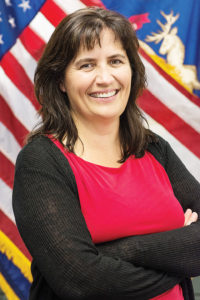 Few in today’s world would dispute that police officers have a tough and dangerous
job.
Few in today’s world would dispute that police officers have a tough and dangerous
job.
At Washtenaw Community College, Joyce Nelson, the new director of the college’s Police Academy and Public Service Training, makes sure recruits under-stand that reality … not to discourage them from police work but to prepare them to be successful in their law enforcement careers.
That’s why “GoPro” cameras are on order so that recruits can begin to get used to walking around wearing video recording devices attached to their uniforms. That’s why, as uncomfortable as they may seem at first, recruits are provided bullet-proof vests to wear during training.
“They need to be ready for the job,” Nelson said. “The first few days of employment with a law enforcement agency should not be full of distractions such as getting used to the feeling of police equipment.”
Nelson goes on to note there are many different types of skills police recruits need to hold to become a successful police officer — such as proficiency with firearms, and an under-standing of first aid, cell phone technology, and life-saving equipment, among others. Additionally, recruits are taught about the importance of strong writing — which will allow them to accurately draft accident and incident reports – an often overlooked element of a police officer’s job.
It doesn’t take long in conversation with her to pick up the fact that Joyce Nelson is passionate about both law enforcement and education. And she looks for the same type of passion in her student recruits.
“I got into police work because I wanted to help people,” she said. “As an officer, my passion for the profession came from my ability to contribute to the safety and well-being of the people in the cities where I worked. I want people to understand that police officers are trying to help their communities, agencies and people in general.”
Starting out as a patrol officer, Nelson worked her way up to sergeant with the Novi Police department; a lieutenant with the Lake Angelus P.D. and then on to the Oakland Police Academy in Auburn Hills, Mich. where she was assistant director. Before coming to WCC, she was chief investigator in the Standards Compliance Section of the Michigan Commission on Law Enforcement Standards (MCOLES). She earned a bachelor’s degree in Criminal Justice from Madonna University and an MBA with a criminal justice concentration from Northcentral University in Prescott Valley, Arizona. She also completed the Police Staff and Command School at Michigan State University.
“We are so fortunate to have someone of Joyce’s caliber, intellect and passion join our team,” said Brandon Tucker, WCC dean of advanced technologies and public service. “I am excited for what the future holds under her leadership.”
Nelson’s experience in law enforcement agencies makes her sensitive to the fiscal realities of municipal budgets. She knows police budgets have been pared back, especially in the smaller communities. And she knows that beginning officers who need additional training will place even more of a drain on the budget. So, she hopes to take the “show on the road,” bringing training to the outlying towns so that lost time away from the job and travel to and from WCC or other community colleges that offer training are reduced.
“We want WCC to become a central hub for law enforcement training– not just for Washtenaw County, but for the surrounding counties as well,” said Nelson. Addressing current tensions between police officers and the communities they serve is a high priority for Nelson. She notes that recruits are vetted before being accepted into the training program. And she adds student recruits at WCC receive over double the cultural awareness training required by MCOLES. WCC recruits also receive implicit bias awareness training and unbiased police training.
“It’s important that our recruits understand the cultural nuances of the communities they serve,” said Nelson. “By understanding the culture they can properly manage difficult incidents and help facilitate a successful resolution.”
Currently there are 21 recruits in WCC’s program. Among them are three women and two minorities. Upon successful completion of the program, the recruits will have earned 16 credit hours toward a degree and will be eligible to take the state licensing examination.
Then, for Nelson, it will be on to the next class of student recruits and the job she loves.
By Susan Ferraro, APR
Director of Media Relations